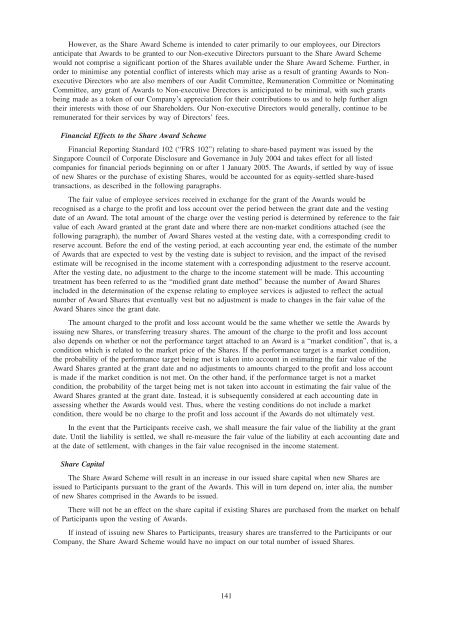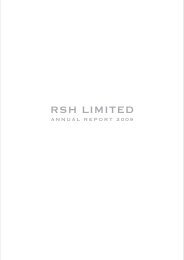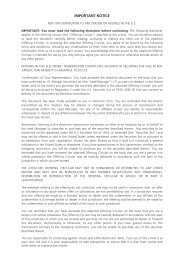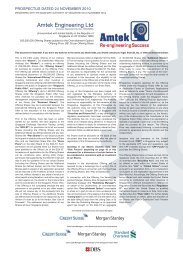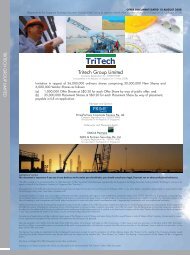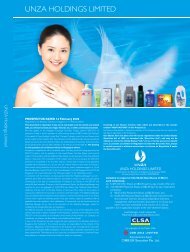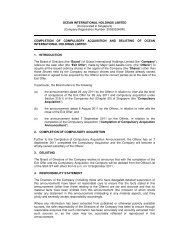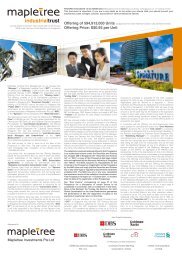O TTO M ARINE L IMITED - Microsoft Internet Explorer - SGX
O TTO M ARINE L IMITED - Microsoft Internet Explorer - SGX
O TTO M ARINE L IMITED - Microsoft Internet Explorer - SGX
Create successful ePaper yourself
Turn your PDF publications into a flip-book with our unique Google optimized e-Paper software.
However, as the Share Award Scheme is intended to cater primarily to our employees, our Directors<br />
anticipate that Awards to be granted to our Non-executive Directors pursuant to the Share Award Scheme<br />
would not comprise a significant portion of the Shares available under the Share Award Scheme. Further, in<br />
order to minimise any potential conflict of interests which may arise as a result of granting Awards to Nonexecutive<br />
Directors who are also members of our Audit Committee, Remuneration Committee or Nominating<br />
Committee, any grant of Awards to Non-executive Directors is anticipated to be minimal, with such grants<br />
being made as a token of our Company’s appreciation for their contributions to us and to help further align<br />
their interests with those of our Shareholders. Our Non-executive Directors would generally, continue to be<br />
remunerated for their services by way of Directors’ fees.<br />
Financial Effects to the Share Award Scheme<br />
Financial Reporting Standard 102 (“FRS 102”) relating to share-based payment was issued by the<br />
Singapore Council of Corporate Disclosure and Governance in July 2004 and takes effect for all listed<br />
companies for financial periods beginning on or after 1 January 2005. The Awards, if settled by way of issue<br />
of new Shares or the purchase of existing Shares, would be accounted for as equity-settled share-based<br />
transactions, as described in the following paragraphs.<br />
The fair value of employee services received in exchange for the grant of the Awards would be<br />
recognised as a charge to the profit and loss account over the period between the grant date and the vesting<br />
date of an Award. The total amount of the charge over the vesting period is determined by reference to the fair<br />
value of each Award granted at the grant date and where there are non-market conditions attached (see the<br />
following paragraph), the number of Award Shares vested at the vesting date, with a corresponding credit to<br />
reserve account. Before the end of the vesting period, at each accounting year end, the estimate of the number<br />
of Awards that are expected to vest by the vesting date is subject to revision, and the impact of the revised<br />
estimate will be recognised in the income statement with a corresponding adjustment to the reserve account.<br />
After the vesting date, no adjustment to the charge to the income statement will be made. This accounting<br />
treatment has been referred to as the “modified grant date method” because the number of Award Shares<br />
included in the determination of the expense relating to employee services is adjusted to reflect the actual<br />
number of Award Shares that eventually vest but no adjustment is made to changes in the fair value of the<br />
Award Shares since the grant date.<br />
The amount charged to the profit and loss account would be the same whether we settle the Awards by<br />
issuing new Shares, or transferring treasury shares. The amount of the charge to the profit and loss account<br />
also depends on whether or not the performance target attached to an Award is a “market condition”, that is, a<br />
condition which is related to the market price of the Shares. If the performance target is a market condition,<br />
the probability of the performance target being met is taken into account in estimating the fair value of the<br />
Award Shares granted at the grant date and no adjustments to amounts charged to the profit and loss account<br />
is made if the market condition is not met. On the other hand, if the performance target is not a market<br />
condition, the probability of the target being met is not taken into account in estimating the fair value of the<br />
Award Shares granted at the grant date. Instead, it is subsequently considered at each accounting date in<br />
assessing whether the Awards would vest. Thus, where the vesting conditions do not include a market<br />
condition, there would be no charge to the profit and loss account if the Awards do not ultimately vest.<br />
In the event that the Participants receive cash, we shall measure the fair value of the liability at the grant<br />
date. Until the liability is settled, we shall re-measure the fair value of the liability at each accounting date and<br />
at the date of settlement, with changes in the fair value recognised in the income statement.<br />
Share Capital<br />
The Share Award Scheme will result in an increase in our issued share capital when new Shares are<br />
issued to Participants pursuant to the grant of the Awards. This will in turn depend on, inter alia, the number<br />
of new Shares comprised in the Awards to be issued.<br />
There will not be an effect on the share capital if existing Shares are purchased from the market on behalf<br />
of Participants upon the vesting of Awards.<br />
If instead of issuing new Shares to Participants, treasury shares are transferred to the Participants or our<br />
Company, the Share Award Scheme would have no impact on our total number of issued Shares.<br />
141


